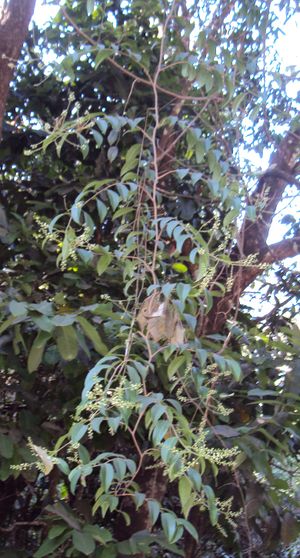Note: This is a project under development. The articles on this wiki are just being initiated and broadly incomplete. You can Help creating new pages.
Difference between revisions of "Embelia ribes - Vidanga"
Chaithrika (talk | contribs) m (Chaithrika moved page Embelia Ribes(Vai Vidanka) to Vidanga: renaming as per convention) |
m (Prabhakar moved page Vidanga to Vidanga (Embelia Ribes)) |
(No difference)
| |
Revision as of 17:36, 29 March 2018
Embelia ribes ( Devnagari : विडंग, Gujarati : 'વાવડીંગ' ), commonly known as false black pepper, white-flowered Embelia, vidanga, vaividang, or vai vidang ,vavding, is a species in the Primulaceae. It was originally described by Nicolaas Laurens Burman in his 1768 publication, Flora Indica.
It is widely distributed throughout India. In Ayurveda, it is considered widely beneficial in variety of diseases and is also used in homeopathy. In India, it is one of the widely and commonly used Ayurvedic herbs.
Ayurvedic uses
- Vavding water given to New Moms to prevent Gas and Stomach Aches[medical citation needed]
- Carminative: Either prevents formation of gas in the gastrointestinal tract or facilitates the expulsion of gas[medical citation needed]
- Anthelmintic: Useful against tapeworms, but not other parasites.[5][full citation needed]
- Alexiteric: It is believed to be useful in snake bite (resists poison),[medical citation needed] but it is not sufficient antidote to the venom.
- It is a common practice to put a few berries of the plant in the milk that is given to young children as it is believed to prevent flatulence.[citation needed]
- Sushruta describes the fruit as anthelmintic, restorative and tonic, and recommends their use along with liquorice root, for the purpose of #strengthening the body and preventing the effects of age.[citation needed]
- Vidhang fruit extract has cestocidal activity[6] and has activity against Ascaridia galli in infected fowl (Gallus domesticus).
Common name
- English - Embelia ribes
- Kannada - ವಾಯುವಿಲಾಂಗ
- Hindi - Vaividang
